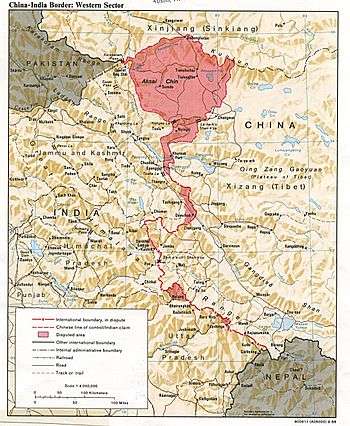Chip Chap River
| Chip Chap River | |
|---|---|
 Map showing Chip Chap River on the China-India border | |
| Countries | India and China |
| Basin | |
| Main source | Aksai Chin |
| River mouth | Shyok River |
| River system | Indus River |
The Chip Chap River (meaning: "quiet river")[1][2] flows from southern Xinjiang region of China to Jammu and Kashmir of India. It discharges into the Shyok River and is one of the upstream tributaries of the Indus River. Its basin area is around 4,410 square kilometres (1,700 sq mi).
The western portion of the river is a popular part of trekking trails in India.[3][4]
The upper portion of the river and its valley is in the disputed Aksai Chin region claimed by India. While one source states that it has been under Chinese control since the early 1950s,[5] two other sources state that Chinese troops first established a border post on the Chip Chap River after May 1961.[6][7] In November 1961 Indian and Chinese forces clashed in the Chip Chap Valley. Several Chinese soldiers were killed and China withdrew its soldiers. During the 1962 Sino-Indian War, the Chinese attacked Indian posts in the valley and have since controlled the disputed area.[8]
References
- ↑ Kapadia, Harish (1999). Across peaks & passes in Ladakh, Zanskar & East Karakoram. New Delhi: Indus Publishing Company. p. 229. ISBN 8173871000.
- ↑ "Lots in a name". The Himalayan Club. Retrieved 29 August 2013.
- ↑ Himalayan Camping, Murgo to Daulat Beg Oldi (DBO)
- ↑ Himalayan Camping, Karakoram Pass Part III
- ↑ Mohan Guruswamy. "No longer a Great Game". Centre for Policy Alternatives, India. Retrieved 29 August 2013.
- ↑ Smith, Chris (1994). "India's Ad Hoc Arsenal". Oxford University Press. p. 75.
- ↑ Kavic, Lorne J. (1967). "India's Quest for Security". University of California Press. p. 169.
- ↑ Calvin, James Barnard (April 1984). "The China-India Border War". Marine Corps Command and Staff College. Retrieved 29 August 2013.
Coordinates: 35°16′30″N 78°11′10″E / 35.275°N 78.186°E